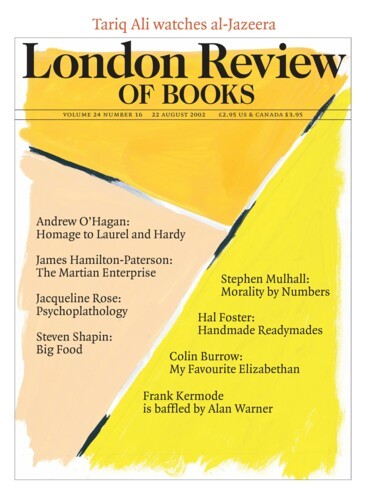There’s an excellent fifty-second song by the White Stripes called ‘Little Room’, which goes like this:
well you’re in your little room
and you’re working on something good
but if it’s really good
you’re gonna need a bigger room
and when you’re in the bigger room
you might not know what to do
you might have to think of
how you got started
sitting in your little room
It is concerned, not unobviously, with a certain kind of success, and how not only to cope with it but to sustain it, too (incidentally, note the nice shift from ‘your’ to ‘the’). As the song appears on their third, very successful (and very good) album, White Blood Cells, the White Stripes presumably know what they’re talking about. ‘Little Room’ might make palliative listening for writers with Second Novel Anxiety Syndrome, which appears to get worse in direct proportion to the success of a first novel – though it might simply be that those cases are more prominent. (J.K. Rowling, suffering from the much rarer condition of Fifth Novel Anxiety Syndrome, seems to have got the message, and has applied for planning permission to add a little room to her large house in Edinburgh to help her rediscover the magic.)
The first novels you hear most about these days are the ones that get the really big advances: Hari Kunzru’s cool million for The Impressionist, for example. (Not quite Rio Ferdinand’s transfer fee, or whatever it was Fox paid Tom Cruise for Minority Report, but then first-time novelists aren’t such sure-fire weapons of mass entertainment as footballers and movie stars, or even TV historians.) It wasn’t always like this. The 25-year-old Graham Greene didn’t get much for The Man Within (1929), his first novel, or rather his first published novel (he’d already had two rejected). On the back of it, however, William Heinemann offered Greene a three-book contract that was lucrative enough for him to leave his job as a subeditor at the Times. The Name of Action (1930) and Rumour at Nightfall (1931) weren’t up to much, and it wasn’t till Stamboul Train (1932) that he found his feet, perhaps because the pressure – would he get another deal? – was back on. All of which should be an object lesson against hyping people too early and giving up on them too soon – as well as against writing too much too quickly and complacently.
Two high-profile second novels due in the autumn are Donna Tartt’s The Little Friend and The Autograph Man by Zadie Smith. Tartt’s first book, The Secret History, came out in 1992. The tale of a bacchanal at an elite New England college that goes murderously wrong, or rather murderously right, and has yet more murderous consequences, it sold wildly well. Bloomsbury, with the financial clout of Harry Potter behind them, have bought the UK rights to the follow-up for just under a million quid. The pubescent magic-magnate is also stumping up the cash for Middlesex, the second novel by Jeffrey Eugenides, author of The Virgin Suicides. (Note to aspiring bestsellerateurs: when it comes to the title, the formula is definite article, adjective, noun. Eugenides is bold to break the rule, particularly in the UK edition: readers might be put off by thoughts of Staines.) The Little Friend is under a vigorously enforced embargo, so you’ll hear no more about it from these quarters till the end of October.
That it took Tartt ten years to write The Little Friend isn’t necessarily a sign of self-reflexive anxiety of influence: she spent nearly a decade writing The Secret History, too. Zadie Smith works faster: it’s less than three years since White Teeth first grinned from the windows of Waterstone’s. And to judge from the beginning of The Autograph Man, Smith has dealt with the danger of being pigeonholed by indulging in a spot of self-pastiche. White Teeth is famously ‘about’ multicultural London, and is full of 1980s pop-culture references. The Autograph Man opens with Alex-Li Tandem, Mark Rubinfine and Adam Jacobs being taken by Alex’s father to see Big Daddy wrestle Giant Haystacks. All three boys are Jewish. Alex is half Chinese. Adam ‘is as black as peat . . . possibly the only black Jew in the ugging world’. ‘So,’ Smith appears to be saying. ‘You want multicultural London and 1980s pop culture? Then take this, mother-uggers.’
Send Letters To:
The Editor
London Review of Books,
28 Little Russell Street
London, WC1A 2HN
letters@lrb.co.uk
Please include name, address, and a telephone number.

